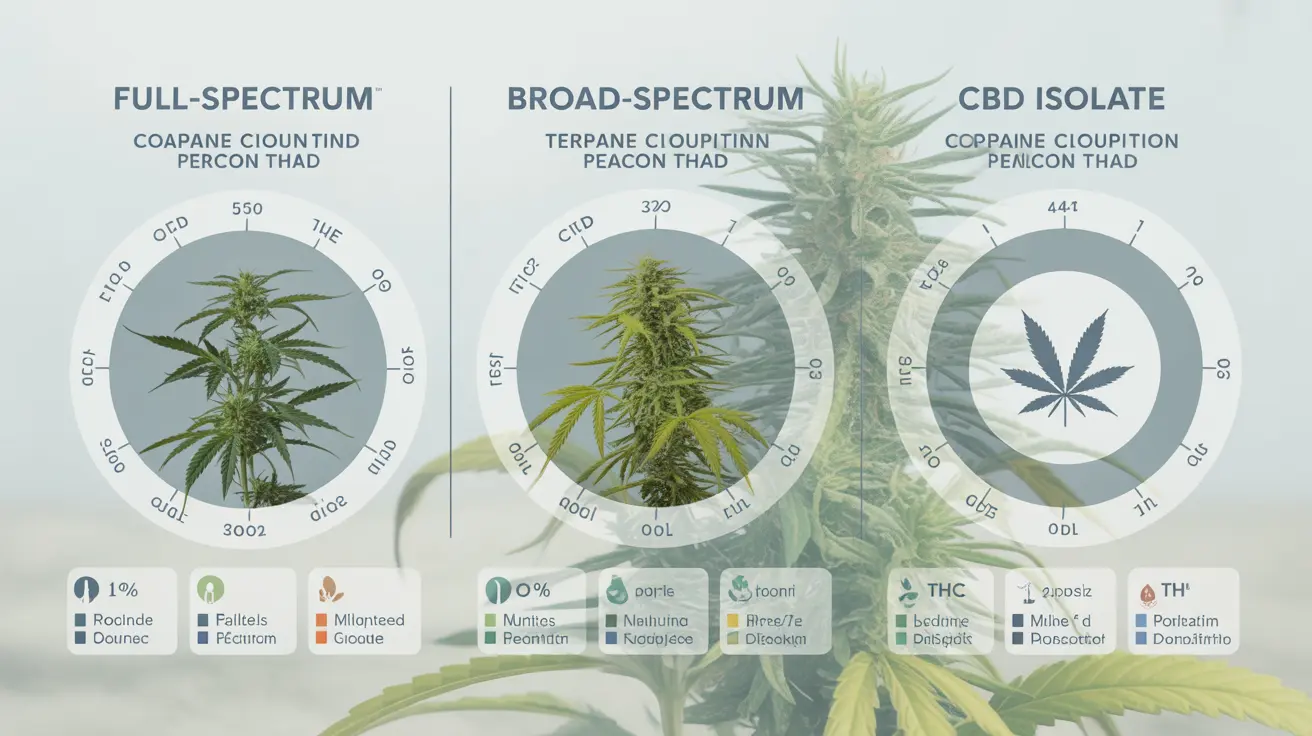As CBD continues to gain popularity in the wellness world, understanding the different types of CBD products available has become increasingly important. Whether you're new to CBD or looking to optimize your current routine, knowing the distinctions between various CBD forms can help you make more informed decisions about your wellness journey.
In this comprehensive guide, we'll explore the three main types of CBD - full-spectrum, broad-spectrum, and CBD isolate - and help you understand which option might be best suited for your specific needs.
Full-Spectrum CBD: The Complete Package
Full-spectrum CBD contains all the naturally occurring compounds found in the cannabis plant, including various cannabinoids, terpenes, and up to 0.3% THC. This complete profile of cannabis plant compounds works together to create what's known as the "entourage effect," potentially enhancing the therapeutic benefits of CBD.
Key components of full-spectrum CBD include:
- Multiple cannabinoids (CBD, CBG, CBN, trace THC)
- Natural terpenes
- Flavonoids
- Essential fatty acids
- Plant proteins
The Entourage Effect Explained
The entourage effect refers to the synergistic interaction between various cannabis compounds, potentially creating more significant therapeutic benefits than isolated compounds alone. This natural synergy may enhance CBD's effectiveness for various wellness applications.
Broad-Spectrum CBD: THC-Free Alternative
Broad-spectrum CBD offers a middle-ground approach, containing multiple cannabis compounds while removing THC through additional processing. This option provides many of the benefits of full-spectrum CBD without the presence of THC, making it an excellent choice for those who want to avoid THC entirely.
Benefits of broad-spectrum CBD include:
- Multiple cannabinoid benefits
- Zero THC content
- Preserved terpene profile
- Potential partial entourage effect
- Suitable for THC-sensitive individuals
CBD Isolate: Pure and Simple
CBD isolate is the purest form of CBD, containing only the CBD molecule with all other compounds removed. This 99%+ pure CBD provides a straightforward approach to CBD supplementation, ideal for those who want to avoid all other cannabis compounds or need precise CBD dosing.
Advantages of CBD Isolate
CBD isolate offers several unique benefits:
- Highest purity level
- No THC content
- Easier to measure precise doses
- No cannabis taste or smell
- Versatile application options
Choosing the Right CBD Type
Selecting the appropriate type of CBD depends on various factors, including your wellness goals, sensitivity to THC, and desired effects. Consider your personal needs, lifestyle, and any potential drug testing requirements when making your choice.
Frequently Asked Questions
What are the main differences between full-spectrum, broad-spectrum, and CBD isolate?
Full-spectrum CBD contains all cannabis plant compounds, including up to 0.3% THC. Broad-spectrum CBD includes multiple cannabinoids but removes THC. CBD isolate is pure CBD only, with all other compounds removed.
How does full-spectrum CBD provide an entourage effect compared to other types?
Full-spectrum CBD creates the entourage effect through the interaction of multiple cannabinoids, terpenes, and other compounds working together synergistically. This effect isn't present in CBD isolate and is only partially available in broad-spectrum products.
Is broad-spectrum CBD a safe option for people who want to avoid THC?
Yes, broad-spectrum CBD is specifically processed to remove THC while retaining other beneficial compounds, making it a safe choice for those who want to avoid THC completely while still benefiting from other cannabis compounds.
What are the benefits of using CBD isolate versus full-spectrum CBD?
CBD isolate offers precise dosing, zero THC content, and no taste or smell. It's ideal for those who want pure CBD without other compounds, while full-spectrum provides potential enhanced benefits through the entourage effect.
How do I choose the right type of CBD product based on my health needs and concerns?
Consider your specific wellness goals, THC sensitivity, and whether you need to avoid THC completely. Full-spectrum may be best for maximum potential benefits, broad-spectrum for THC-free benefits, and isolate for pure CBD effects or precise dosing needs.




